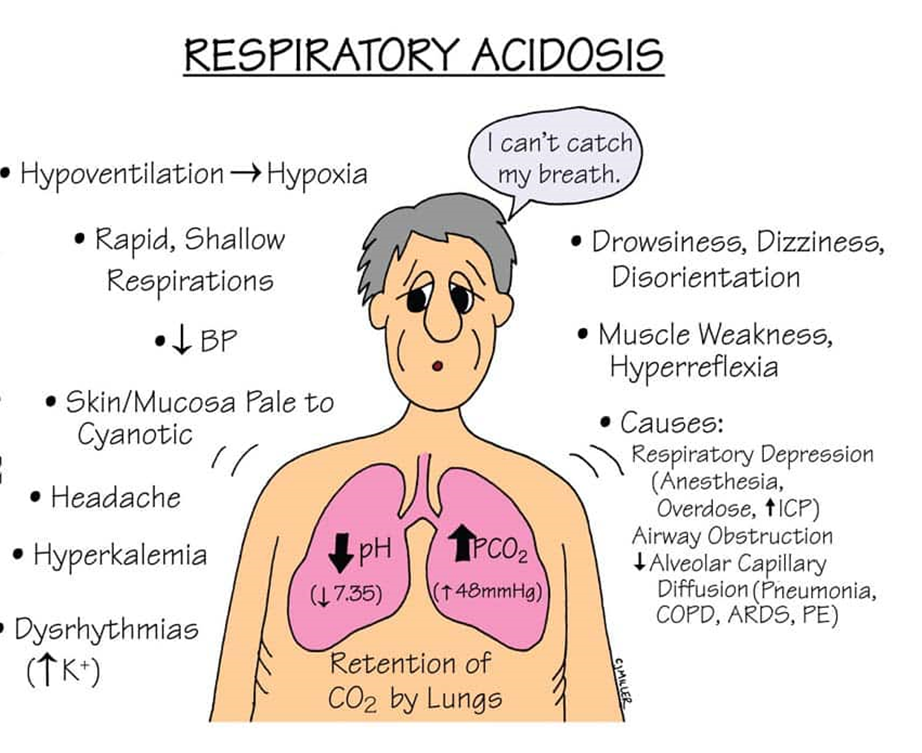A patient has the following blood gases: PaCO2 33, pH 7.50, HCO3 23. Which of the following could NOT be the cause of this condition?
Aspirin toxicity
Fever
Anxiety attack
Chronic obstructive pulmonary disease (COPD)
The Correct Answer is D
A. Aspirin Toxicity:
Effect on Blood Gases: Aspirin toxicity can cause respiratory alkalosis due to increased respiratory rate (hyperventilation), leading to a decreased PaCO2 and increased pH.
Relation to Given Blood Gases: It could potentially cause the observed blood gas values (low PaCO2 and high pH), making it a possible cause.
B. Fever:
Effect on Blood Gases: Fever might cause hyperventilation, resulting in respiratory alkalosis with decreased PaCO2 and increased pH.
Relation to Given Blood Gases: It could potentially cause the observed blood gas values.
C. Anxiety Attack:
Effect on Blood Gases: Anxiety attacks can lead to hyperventilation and subsequent respiratory alkalosis with low PaCO2 and high pH.
Relation to Given Blood Gases: It could potentially cause the observed blood gas values.
D. Chronic Obstructive Pulmonary Disease (COPD):
Effect on Blood Gases: COPD typically causes respiratory acidosis due to impaired gas exchange, resulting in elevated PaCO2 and decreased pH.
Relation to Given Blood Gases: COPD wouldn't typically cause the observed blood gas values of low PaCO2 and high pH.
Nursing Test Bank
Naxlex Comprehensive Predictor Exams
Related Questions
Correct Answer is ["C","E"]
Explanation
A. Asthma:
Explanation: Asthma is associated with respiratory alkalosis, not respiratory acidosis. In asthma, there is often hyperventilation leading to a decrease in carbon dioxide levels.
B. Hyperventilation:
Explanation: Correct. Hyperventilation can cause respiratory alkalosis, not respiratory acidosis. It leads to a decrease in carbon dioxide levels.
C. Chronic obstructive pulmonary disease (COPD):
Explanation: Correct. Conditions like COPD can lead to respiratory acidosis. In COPD, there is impaired ventilation, leading to an accumulation of carbon dioxide.
D. Renal insufficiency:
Explanation: Renal insufficiency is not a direct cause of respiratory acidosis. Respiratory acidosis is primarily related to respiratory system dysfunction.
E. Pneumonia:
Explanation: Correct. Pneumonia can cause respiratory acidosis. In pneumonia, there may be difficulty in eliminating carbon dioxide due to impaired gas exchange.

Correct Answer is A
Explanation
A. "I have difficulty breathing when walking 30 feet":
Explanation: Difficulty breathing on exertion (dyspnea) is a common symptom of iron-deficiency anemia. This is because iron is a crucial component of hemoglobin, which carries oxygen to body tissues. In the absence of sufficient iron, the oxygen-carrying capacity of the blood is reduced, leading to symptoms such as shortness of breath.
B. "I feel hot all of the time":
Explanation: Feeling hot all the time is not a typical symptom of iron-deficiency anemia. Anemia is more likely to cause symptoms related to poor oxygen delivery, such as fatigue and shortness of breath.
C. "I have a difficult time falling asleep at night":
Explanation: Difficulty falling asleep is not a classic symptom of iron-deficiency anemia. Symptoms are more likely to be related to fatigue and weakness.
D. "I have an increase in my appetite":
Explanation: An increase in appetite is not a typical symptom of iron-deficiency anemia. In fact, individuals with anemia may experience a decrease in appetite.
Whether you are a student looking to ace your exams or a practicing nurse seeking to enhance your expertise , our nursing education contents will empower you with the confidence and competence to make a difference in the lives of patients and become a respected leader in the healthcare field.
Visit Naxlex, invest in your future and unlock endless possibilities with our unparalleled nursing education contents today
Report Wrong Answer on the Current Question
Do you disagree with the answer? If yes, what is your expected answer? Explain.
Kindly be descriptive with the issue you are facing.
